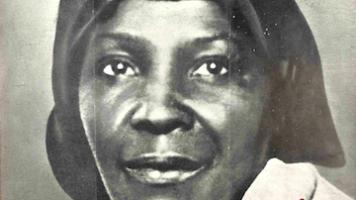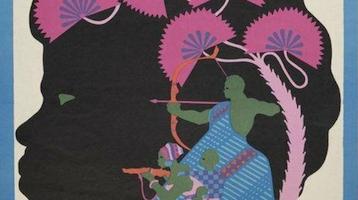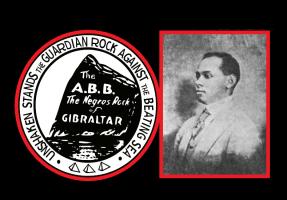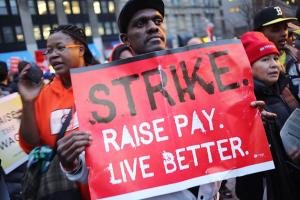A May Day 1928 essay by Black communist Williana “Liana” Jones Burroughs – aka Mary Adams – recounts the history of African revolt in the Americas.
Williana “Liana” Jones Burroughs was among the most prolific writers and energetic organizers from that cohort of notorious Black communists animating the street-corners, churches, and community halls of Harlem in the 1920s. Born on January 2, 1882 in Petersburg, Virginia, Burroughs moved to New York City as a child. She attended New York City Normal College, today’s Hunter College, and after graduating, taught for almost twenty years in New York City’s public schools. Through the New York City’s Teachers Union, Burroughs became active with the Communist Party (CP). She was an advocate for educators, but was also an early member of the American Negro Labor Congress (ANLC). Formed in Chicago in 1925, the ANLC was meant to serve as a vehicle to increase Black membership in and participation with the CP. Although the ANLC had many famous Black names on its roster – including Lovet Fort-Whiteman, Otto and Hermina Huisoud, Grace Cambell, William L. Patterson, James L. Ford, Richard B. Moore, and George Padmore – it had little success in its broader recruiting efforts. In the late 1920s, Burroughs made a number of trips to the Soviet Union, eventually settling in Moscow in 1935 where she worked for the Moscow News and as an announcer and editor for Radio Moscow. She returned to the United States in 1945, two months before her passing on December 24, 1945.
As “Mary Adams,” her party name, Burroughs wrote for The Daily Worker, Working Woman, the ANLC journals Negro Champion and The Liberator, and The Negro Worker, the journal published by the International Trade Union Committee of Negro Workers (ITUCNW) and edited by James Ford and George Padmore. She wrote on the plight of Black teachers, on the working conditions of “laundry slaves,” and on labor of Black women and children in colonial Africa. Burroughs also wrote on Black resistance. For a special issue of The Negro Worker she wrote on Black social movements in North and South America and the Daily Worker published Burrough’s essay “Record of Revolts in Negro Workers’ Past.”
Reprinted below, Burroughs’ “Record of Revolts,” published on Labor Day, May 1, 1928, is a short and succinct account of the history of Black rebellion in the Americas. Burroughs draws on the research of Hubert Harrison and W.E.B. Du Bois, while anticipating CLR James’ later recovery of pan-African documented in his A History of Negro Revolt, published a decade later, in 1938. Burroughs’s essay begins with African resistance to slavery on the continent and goes on to cover slave revolts in the US south, the Underground Railroad, the communities of runaways and maroons throughout the Americas, and the Haitian Revolution. In short, Burroughs marks May Day by dispelling the idea that enslaved Africans were passive and docile, cowering meakishly beneath white power and the lash.
Record of Revolts in Negro Workers’ Past
Mary Adams
Some years ago, the late Hubert Harrison correctly pointed out that the Negro in America was learning nothing of his race’s history. Brought up in a hostile environment he had no record of African achievement in tribal government, industry or art. The story of ancient Negro kingdoms was a sealed book to colored America. His achievements in this country were minimized also.
The attitude of self depreciation which this situation developed was deliberately fostered by the white ruling class. White America has been callous and brutal in its expression of contempt for everything black.
In all this campaign there has been no more vicious slander than the gibe that the Negro is yellow.
It was charged that he would not resist oppression.
Persistent research by Harrison, Du Bois and others had put a stop to such charges. Thanks to the efforts of these men Negroes know now that they have a rich heritage of revolt.
The Negro’s resistance at the outset of the slave trade was marked by the death of thousands of African natives. Raiders had a hard fight in getting together their captives for the slave market. Slavers, carrying their living cargo over the ocean, lost many on every trip, who leaped to death rather than live in slavery.
The Negro Year Book lists twenty-five slave revolts in the South. The names of Denmark Vesey, Nat Turner, Cato and Gabriel, leaders in notable insurrections, are becoming household words among us. The names of the colored men who were with John Brown at Harper’s Ferry are known and revered today.
Thousands of slaves made their escape whenever the chance offered. Southern slave owners testified that so many Negroes ran away that the institution itself was threatened. Osceola and other slaves from Georgia found a haven among the Seminoles in the Florida everglades. When the government found it impossible to defeat or dislodge these runaways, the whole tribe was transported to Indian Territory. The presence of colored groups in Mexico and Canada is evidence of the Negro’s resistance. These people are the descendents of runaway slaves.
Many Negroes were active as agents or secretaries in the “Underground Railway,” the organized movement against slavery. In St. Louis free Negroes organized the Knights of Liberty. After ten years’ work this group was finally merged with the Underground Railway. Some agents had the job of going back into slave territory and helping out their brothers. One heroic woman, Harriet Tubman, herself a runaway, made nineteen trips back into the South, bringing out over three hundred people. She did this knowing all the time there was a price on her head.
America did its best, but was never successful in keeping from the Negroes the thrilling story of Toussaint L’Ouverture. This Haitian slave led a successful revolt against the French masters on the island. He then fought for his country’s independence, defeating picked troops from Spain, England and France. Napoleon’s brother-in-law captured him through treachery, carried him to France, where he died, in a dungeon, alone and neglected. It has been stated that Napoleon was glad to cede Louisiana to America because of the trouble which L’Ouverture made for him in Hayti. Haiti gave asylum to Bolivar in his defeat, and later gave him aid in fitting out the forces with which he freed Bolivia.
In other parts of the West Indies and in Guiana, escaping slaves entrenched themselves in the jungle country or in mountain fastnesses. These are the famous Maroons. Their position was so strong that their governments, finding it impossible to beat them, made terms with them. In some places they were allotted a certain territory and permitted to have their own rulers. In Guiana they possess this land to this day.
The long history of Negro suffering has produced these these fighters mentioned above, along with men like Frederick Douglas, Dessalines, Shields, Green, Robert Smalls and others less well known. Their fight against the established institutions and governments of their time was revolution and their names are the names of revolutionists.
Mary Adams, “Record of Revolts in Negro Workers’ Past,” Daily Worker, (1 May 1928).



















